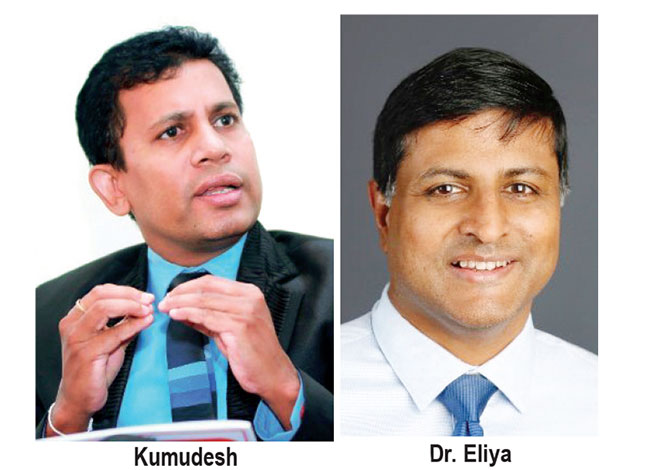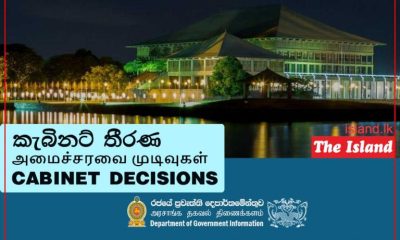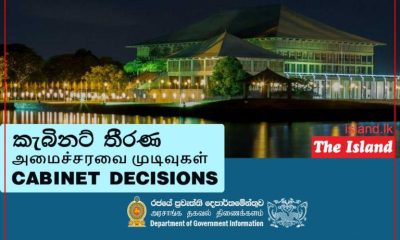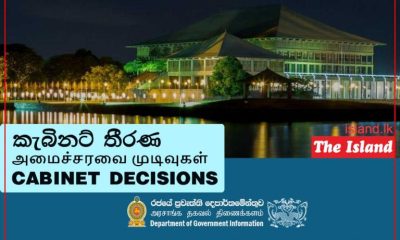News
SL defenceless, warn experts

New COVID variants
By Rathindra Kuruwita
Due to the lax testing at the Bandaranaike International Airport (BIA), there is a strong possibility that any new variant of COVID-19 entering the country, College of Medical Laboratory Science (CMLS) President, Ravi Kumudesh told The Island yesterday commenting on the detection of a new coronavirus variant spreading in South Africa.
Even a travel ban would be useless unless the country enhances its testing and surveillance capacities, Kumudesh said.
Kumudesh said that PCR tests were not conducted on passengers on arrival and that it was likely that even those not fully vaccinated were entering the country. “Gene sequencing in respect of those infected with COVID inside the country was at a minimal level, and therefore, there is no way we can find out whether a new variant has entered the country until it is too late.
“There are two state-of-the-art labs in the BIA but no tests are done there. We are not ready, at all. Several nations are imposing travel bans on travellers from South Africa and the region. Perhaps, we should follow suit. However, the fact that we don’t test those coming in means that even a travel ban might be useless,” he said.
Kumudesh added that the number of PCR tests conducted had dropped to such a low level that reagents used in some labs for PCR testing are now nearing the expiry dates. The attitude of health officials at the airport is such that everyone operates on the basis that testing of passengers is not important.
Executive Director of the Institute for Health Policy (IHP), Dr. Ravi Rannan-Eliya yesterday said the detection of the new South African variant was potentially very bad news for all countries, and certainly for Sri Lanka.
“We still don’t have sufficient data on this, but I am very worried. It was only discovered a few days ago, but the scanty evidence strongly indicates that this new variant is driving a rapid increase in infections in S Africa. Only 100 cases have been confirmed officially, but reports indicate it may be 90% of new cases since Wed in Johannusburg,” he said.
Dr. Rannan-Eliya said that his best guess was that three out of four South Africans had been infected by COVID during the pandemic. Thus, a large number of them had acquired natural immunity. Moreover, 25% of others have been vaccinated.
“So this rapid spread despite a lot of immunity is very disturbing. This really points to this new variant—B1.1.529—being both more infectious and also significantly immune resistant. Something that also matches with its particular mutations,” he said.
Dr. Rannan-Eliya said he was not surprised at the emergence of the new variant because contrary to many experts who drink the kool-aid, there is no scientific basis to think SARS-CoV-2 had matured in its evolution. It might still have a lot of potential to evolve greater immune evasion and virulence, and that we should act on that basis.
“Second, because most of the world is following the misguided strategy of just accepting the virus (hey you – USA, UK, Sri Lanka…), the virus has plenty of chances to keep on mutating more because the truth is more of the virus is circulating than ever before. Third, despite a lot of nonsense about how T-cell immunity is going to protect us, there’s really no evidence that either infection or current vaccines and boosters will ever give us long-lasting immunity. We simply don’t know.”
Countries like South Africa, Peru, etc., who had such high levels of infection that much of their population was infected more than once, still continue to suffer new waves of infection.
“So this is bad news for all of us humans on planet earth, but very definitely for us in Sri Lanka. Why? Because based on how our medical establishment and govt authorities think, we will be slow or refuse to put the necessary border controls in to prevent this entering. And when it does enter-which is inevitable if this variant spreads globally–we will be slow to detect its entry, we will refuse to sound the alarm, and we will do everything but actually attempt to stop it. That’s been our track record, so why would it change? Worth noting that if this starts a new wave in Southern Africa, it’s just three to four months after their third wave. So just as immunity starts waning appreciably from natural infection (or vaccines). That gives us a strong hint of what our future holds unless we end this pandemic.”
News
Submission of gazette notifications for the concurrence of the Parliament.

The Cabinet of Ministers approved the resolution furnished by the President, in his capacity as the Minister of Finance, Planning and Economic Development to submit the following notification / order / rule published in the government gazette notification to the Parliament for its concurrence:
• Notification on the revision of tax limit of luxury on motor vehicles under the Finance Act No. 35 of 2018 published in the extraordinary gazette notification No. 2421 / 41 dated 31.01.2025.
• Rule issued under the Production Levy (Special Provisions) Act No. 13 of 1989 on revision of production levy rate for vehicles operated with electricity published in the extraordinary gazette notification No. 2421 / 42 dated 31.01.2025
• Order issued under the Finance Act No. 25 of 2003 on extension of the period on which the 50% relief is active which is given to the deviation levy published in the extraordinary gazette notification No. 2421 / 30 dated 31.01.2025
News
Cabinet approval to prepare new Act for securing the rights of plant species

Although there are legal provisions for the right to publish, technical planning, right of patent, trademarks and enterprises etc, in the Intellectual Property Act No. 36 of 2003, there are no provisions for securing the rights of plant species (relevant to breeders, researchers and farmers).
In addition, no patents can be issued for flora and fauna according to the provisions of the intellectual rights act. Therefore, approval of the Cabinet of Ministers was granted at their meeting held on 22.05.2024 to introduce a new act for securing the rights of plant species.
Wherefore, the Legal Draftsman has pointed out that policy approval of the new Cabinet of Ministers should be taken to complete the drafting of the new flora species rights securing act.
Accordingly, the Cabinet of Ministers granted approval to the proposals submitted by the Minister of Agriculture, Livestock, Lands and Irrigation for the preparation of the said draft bill.
Latest News
National minimum monthly salary for private sector employees raised to Rs. 27,000/-, minimum daily wage to Rs. 1080/-

Parallel to salary hike of public sector officers by the budget proposals 2025, it has been proposed to increase the salaries of private sector employees as well.
Accordingly, the Cabinet of Ministers granted approval to the proposal submitted by the Minister of Labour to revise the national minimum monthly salary and national minimum daily wage and follow other legal actions as follows:
• To raise the minimum national monthly salary by rupees 9,500/- from rupees 17,500/- to rupees 27,000/- with effect from 01.04.2025
• To raise the minimum national daily salary by rupees 380/- from rupees 700/- to rupees 1,080/- with effect from 01.04.2025
• To raise the minimum national monthly salary by rupees 3,000/- from rupees 27,000/- to rupees 30,000/- with effect from 01.01.2026
• To raise the minimum national daily salary by rupees 120/- from rupees 1,080 /- to rupees 1,200/- with effect from 01.01.2026
-

 Business2 days ago
Business2 days agoColombo Coffee wins coveted management awards
-

 Features3 days ago
Features3 days agoStarlink in the Global South
-

 Business4 days ago
Business4 days agoDaraz Sri Lanka ushers in the New Year with 4.4 Avurudu Wasi Pro Max – Sri Lanka’s biggest online Avurudu sale
-

 Business5 days ago
Business5 days agoStrengthening SDG integration into provincial planning and development process
-

 Business4 days ago
Business4 days agoNew SL Sovereign Bonds win foreign investor confidence
-

 Sports5 days ago
Sports5 days agoTo play or not to play is Richmond’s decision
-

 Features3 days ago
Features3 days agoModi’s Sri Lanka Sojourn
-

 Sports5 days ago
Sports5 days agoNew Zealand under 85kg rugby team set for historic tour of Sri Lanka


















